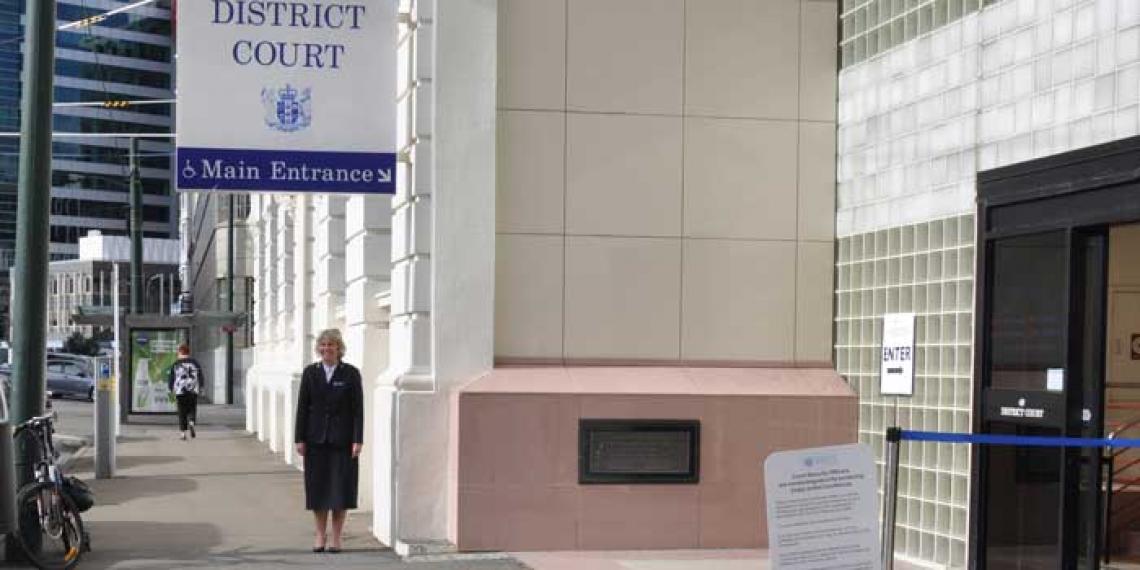You are here
A court with a difference

The Special Circumstances Court offers a fresh approach to supporting the homeless through Wellington’s court system.
In 2011, a hui was organised by Te Roopu Aramuka Wharoaroa, a Capital and Coast District Health Board homelessness initiative, to discuss different issue around homelessness. One workshop focused on those who are homeless and continue to find themselves in the justice system.
At the hui, Her Honour Judge Susan Thomas put forward the idea of running a court similar to one being run in Auckland: Te Kooti o Timatanga Hou—The New Beginnings Court. After several meetings, it was decided to start a similar model of court in Wellington. So, with no funding, just the goodwill and agreement of the agencies involved, the Special Circumstances Court was launched on 6 March 2012.
Purpose and process
The purpose of the Special Circumstances Court is to provide a solution-focused programme to address repetitive low-level offending by those who are homeless in Wellington. Homelessness for the purpose of this court is defined as ‘living situations where people with no other options to acquire safe and secure housing: are without shelter, in temporary accommodation, sharing accommodation with a household or living in uninhabitable housing’. This is also the definition used by Statistics New Zealand.
Once a person has been identified (by police, lawyer, judge, community agency or themselves) as meeting some or all of the criteria of the court, they are assessed for eligibility. As coordinator for the Special Circumstances Court, it is my role to carry out this assessment. I explain what the court is about and what is required of the participant. After this, if it is clear that the participant is eligible and keen to commit to the process, I forward a letter to the presiding judge advising them of the acceptance of the participant into the Special Circumstances Court programme. The participant is then separated from the normal court process and entered into the Special Circumstances Court process instead.
Where the Special Circumstances Court differs from the normal court process is its focus on a therapeutic jurisprudence approach with frequent judicial monitoring. Once a participant is accepted into the programme, a community worker is selected to work with the participant and develop a client-focused rehabilitation plan. This plan is presented to the court, and monitored by regular court appearances to gauge participation and progress. The Special Circumstances Court is based around the justice system, but outcomes are strongly influenced by the engagement of the participant in a tailored rehabilitation plan.
Benefit to participants
The benefit to the person choosing to participate in the Special Circumstances Court is that they are able to identify and, with the court’s assistance, address issues in their lives contributing to their offending. Participants are helped to obtain the support they require and to develop strategies so they can better deal with the issues in their lives. With a rehabilitation plan in place, the desired outcome is that the offending of participants reduces, or ideally ceases.
As well, the Special Circumstances Court is a more informal court setting, where participants appear before the same judge each month to discuss their rehabilitation plan with the judge. Their community worker is also present and able to talk directly to the judge about plan and progress (or lack thereof). The court not only looks at the participants’ offending but also considers what else is happening in their lives.
This is a voluntary court. Participants can choose to withdraw and be returned to the normal court system at any time.
Qualifying criteria
The criteria for the Special Circumstances Court list are that a person must be 17 years or older, homeless (utilising the wider definition), and assessed as suffering from impaired decision-making capacity as a result of mental health issues, intellectual disability, chronic alcohol, drug or substance abuse, or brain/neurological disorder. In addition, the offence or nature of their offending must be low level and have occurred in the Wellington area. Serious drug offences, sexual offences and serious offences of personal violence are disqualifying offences.
Further to meeting this criteria, an individual needs to have either pleaded guilty or accepted culpability for their actions and be engaging fully in the rehabilitation programme put in place for them.
Addressing causes of offending
The Special Circumstances Court is helpful as it encourages people to look beyond their offending to the causes behind that offending. Participants then work with an agency they have chosen to help them address those causal issues.
Since the court started, we have seen reduced offending by some. Two people have entered alcohol and drug rehabilitation. Some have been assisted into accommodation. Others have identified areas they need help with and have found the assistance they require. For some, we have seen a total change in their attitude toward life, which is very encouraging.
It is still early days, but the signs are promising. It is exciting and rewarding to be part of a court with a difference—one that is aimed at helping people make lasting change and leave criminal activity in the past.
By Lee Edney (abridged from War Cry 20 April 2013, p18-19)
Major Lee Edney is a Salvation Army court officer based in Wellington who works as coordinator of the Special Circumstances Court as part of her role.